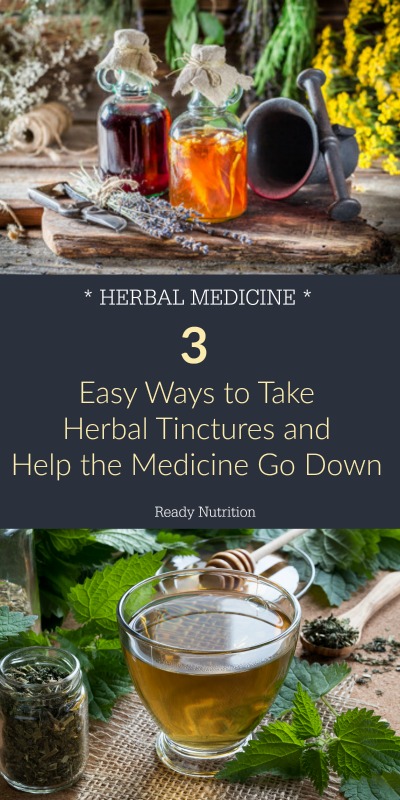As people turn away from taking pills and the pharmaceutical companies’ side effect-riddled remedies, many look to herbal tinctures as a more natural and holistic approach their health. While the benefits of herbal tinctures are many, they often don’t taste all that appealing, so here are three easy ways to remedy that small problem!
If you are looking to reap the benefits of medicinal plants, it wouldn’t hurt to take a look at herbal tinctures. Tinctures are a higher potency compared with herbal teas, and therefore, have a faster reaction time once ingested.
What is a tincture?
A tincture is a concentrated liquid herbal extract made from herbs that are taken orally.
Tinctures are typically made by soaking herbs in alcohol for several weeks to extract the active components (phytochemicals) of the plants. After a few weeks, the herbal mixture is strained and the herb parts are removed, leaving behind the concentrated liquid.
How Do Tinctures Work?
Tinctures bypass the need to digest entire herbs in the gut and are easily absorbed by the body. Because they are concentrated, dosages are small and can be diluted in your favorite beverage. Tinctures have a milder, more subtle effect than pharmaceutical drugs, so it is important to have realistic expectations if you are using them for a chronic condition. Some tinctures DO provide rapid relief of symptoms, but most do not offer a quick fix.
Some experimentation with dosages and frequency might be necessary to figure out what works best for you. Natural medicines like tinctures can be very effective and do have a long history of successful use, so be patient and consistent, and remember to make additional lifestyle changes to support good health and healing as well.
Do Tinctures Taste Bad?
In short, yes. They often leave a dislikable taste in the mouth. Alcohol-based tinctures especially can be unpleasant. But there are a few ways to help get them down a little more smooth.
From a previous article on the subject, we suggested that some herbalists recommend taking tinctures under the tongue and holding the liquid there for a few seconds before swallowing. The reasoning behind taking the drops sublingually (drops are placed under the tongue) is that the arterial blood supply under your tongue rapidly absorbs the medicinal benefits. That said, the taste is usually unpleasant and bitter due to the alcohol and concentrated herbs.
3 Ways to Help the Medicine Go Down

- Dilute with sparkling water – anyone who knows me knows that I drink a lot of sparkling water! Adding your tinctures to a glass of ice-cold sparkling water doesn’t make the taste go away completely, but it does improve it. If you are a big fan of carbonated beverages, give this one a try! You could even try to add the tincture to flavored sparkling water to hide the taste a little more. I prefer lime, but go with what you like. Likewise, you can also add to some warm water. Doing so dilutes the concentrated herbal tinctures and helps it digest better. It’ll also help dilute the taste enough that it could be tolerable.
- Add to some honey – You know the song, “Just a spoonful of honey makes the medicine go down.” Not only will you be adding some sweetness to your tincture, but honey has medicinal qualities that can help soothe a sore throat, support your immune system and more.
- Add to your favorite cup of tea – Many people find tinctures more palatable in tea, as the hot water will “burn off” the alcohol content without disturbing the medicinal quality. There are a lot of great tea blends out there! Ready Nutrition’s herbal teas are fantastic with the tinctures! Consider combining them to find a flavor that’s palatable and gives you the health benefits you are looking for!
If you have any tips and tricks to help the herbal tincture go down, let us know! Share your ideas with our readers!
Ready Nutrition is proud to offer the following high-quality organic tinctures

